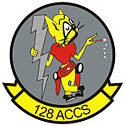128th Airborne Command and Control Squadron
| 128th Airborne Command and Control Squadron | |
|---|---|

128th ACCS E-8C Joint STARS 96-004
|
|
| Active | 1 February 1918-Present |
| Country |
|
| Allegiance |
|
| Branch |
|
| Type | Squadron |
| Role | Airborne Command and Control |
| Part of | Georgia Air National Guard |
| Garrison/HQ | Robins Air Force Base, Warner-Robins, Georgia |
| Tail Code | "GA" |
| Engagements |
World War II Korean War Vietnam War Operation Desert Storm Kosovo Operation Enduring Freedom Operation Iraqi Freedom |
| Insignia | |
| 128th Airborne Command and Control Squadron emblem |  |
The 128th Airborne Command and Control Squadron (128 ACCS) is a unit of the Georgia Air National Guard 116th Air Control Wing located at Robins Air Force Base, Georgia. The 128th is equipped with the E-8C Joint STARS.
The squadron is a descendant organization of the World War I 840th Aero Squadron, established on 1 February 1918. It was reformed on 1 May 1941, as the 128th Observation Squadron, and is one of the 29 original National Guard Observation Squadrons of the United States Army National Guard formed before World War II.
The 128th Airborne Command and Control Squadron traces its origins to the 840th Aero Squadron, formally organized at Rich Field, Waco, Texas on 4 February 1918. However, the 840th's history itself dates to the middle of December, 1917 when many of the squadron members first enlisted in the Army at Fort Slocum, New York and the Columbus Barracks, Ohio. Just before Christmas, 1917, the men were transported to Kelly Field, near San Antonio, Texas where they began indoctrination into the Army as an unorganized unit. Many men were transferred into and out of the unit in its first weeks at Kelly. On 8 January, the men was transferred to Rich Field, and placed in temporary squadrons. Time was taken up by drills, hikes, physical training and other exercises. Also the men attended various lectures about military courtesies and customs. Finally, on 4 February, 150 men from the group were selected and formed into the 840th Aero Squadron.
After several more weeks of Army indoctrination training, the squadron was ordered for overseas service, being transferred to the Aviation Concentration Center, Garden City, Long Island. It arrived at Mineola Field on 4 March 1918 where it was prepared and equipped for overseas duty. On 15 April, the squadron was ordered to the Port of Entry, Hoboken, New Jersey where it boarded the former White Star Line liner SS Canopic. After an uneventful Atlantic crossing, the squadron arrived at Liverpool, England where it boarded a train headed south to Winchester, where it arrived at the Romney Rest Camp. There, the 840th was detached to the Royal Flying Corps for technical training, arriving at the No. 3 Western Aircraft Depot, RFC Yatesbury, Wiltshire, on 4 May. There the squadron was placed in different departments of the Depot and were engaged in the production and repair of airplanes. The 840th was the second American squadron assigned to the Depot, and there was quite a curiosity by the English about them. The men were warmly received in the villages around the Depot and celebrated the 4th of July in Bristol. On 13 August, training ended and the squadron moved to Southampton for transport across the English Channel to France.
...
Wikipedia
